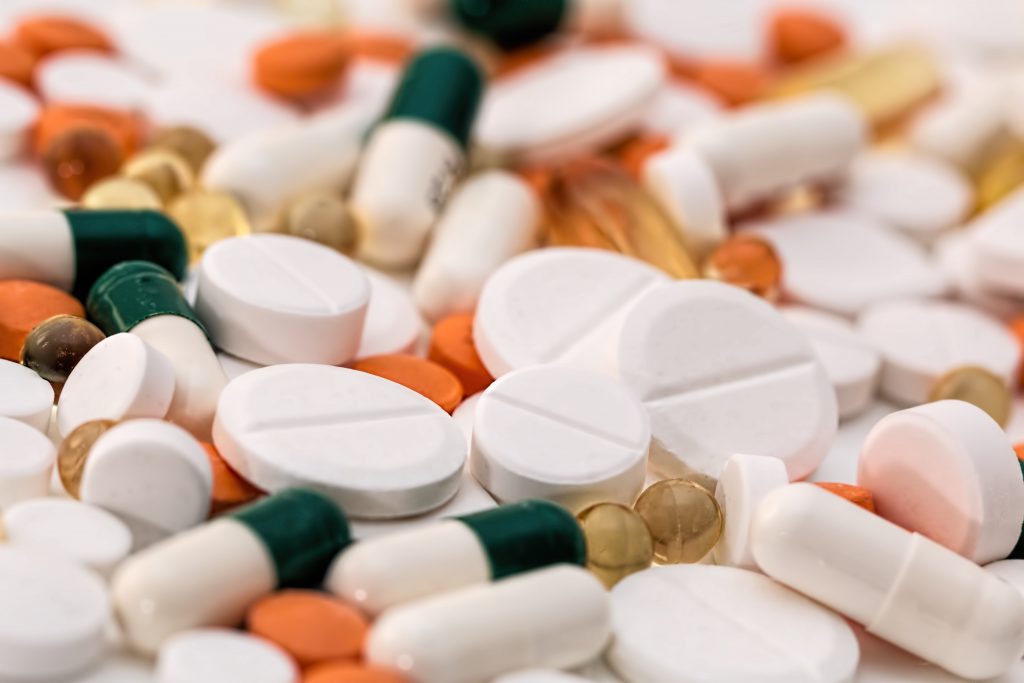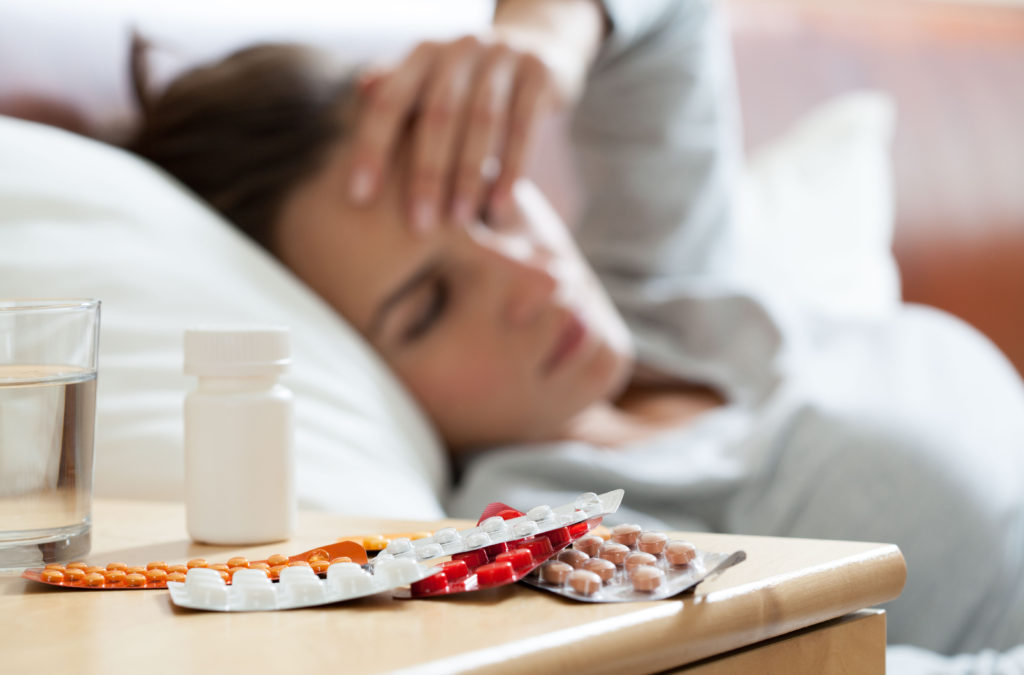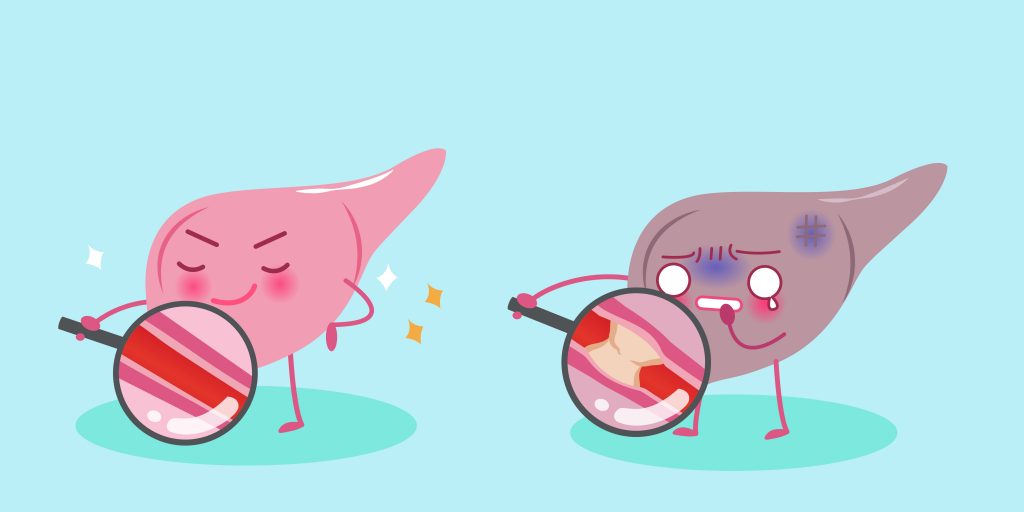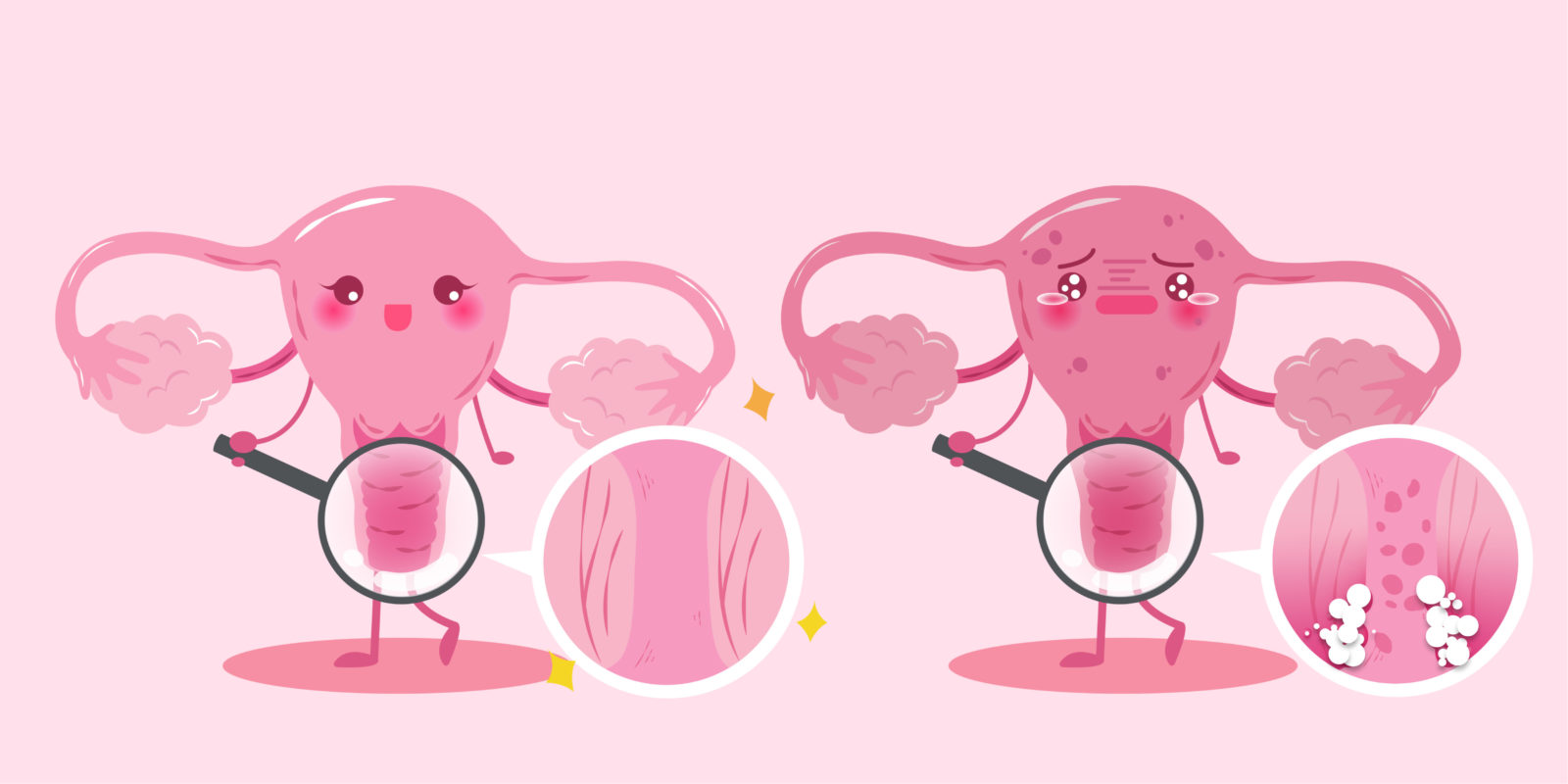Causes of Vaginal Yeast Infection
Candida is an opportunistic organism since the 1940s with the introduction of antibacterial antibiotics as a medicinal therapy, there has been an ever-increasing issue of serious candidal infections in individuals who have used antibiotics (ed. Prasad, R., 2017). There are numerous other reasons for candida overgrowth – or vaginal yeast infection – that we will get into in this section, it is important to understand that it is usually a combination of issues that lead to a yeast infection, some being more prevalent than others. Each individual is unique and it is hard to pinpoint that this one thing is what is causing a yeast infection in your body, however, one of the most important things to look at is your digestive health and what you put into your body. Feeding bad bacteria and creating an environment for it to thrive is not going to prevent infections even if you take antibiotics or medication. It is important to grow healthy bacteria colonies and feed the good bacteria while starving the bad guys so they can’t wreak havoc.
To learn more check out our article on Vaginal Yeast Infections.
Antibiotic Use
Antibiotics are sometimes necessary, however, they eliminate the good bacteria in our digestive system and body along with the bad (Ross, J, 2012). There may be certain strains that can withstand antibiotics, however, the healthiest digestive systems are the ones that have diverse colonies of probiotics. If you are on long-term antibiotic therapy or take antibiotics frequently you likely have an overgrowth of candida in the body, it may not be in the vagina, however, if the issue is not addressed, per se in the digestive tract, the likelihood of it spreading to the vagina or another area of the body is high (Martino, M.D., 2011). Antibiotic usage can also lead to a weakened immune system, leading to a potential overgrowth of candida (ibid) – and even a vaginal yeast infection.

Bad Hygiene
The vagina is a self-cleaning organ, it does not need any extra soap, sprays or perfumes (please no perfume). However, many of us are under the impression that it is very dirty. Menstrual flow occurs naturally every month, it is also an opportunity for the body to rid toxic build-up from the vagina, even concerning seminal fluid, the vagina has a way to clean all that out no problem. The use of soaps, douching chemicals, bubble baths and other fancy smelling liquids on the vagina severely negatively affects beneficial vaginal flora, hindering their growth and allowing in their place bad bacteria, and yeast to flourish (Batra, S., 2003).
Menstrual flow is one way that the vagina cleans itself out, another is regular vaginal discharge, sometimes it may simply be clean and odorless, if there was something unwanted present in the vagina and it is being cleared out it may have a slightly musty odor but nothing that would be offensive. Splashing clean water on the area is a great way to clean it, even if you are menstruating. If you need to use soap, use a light soap on your inner thighs, around your groin but away from the vagina – rinse very thoroughly (ibid). It is when the vagina is not at its best that odor and infection occurs, therefore, it is important to maintain healthy bacteria cultures, a well functioning digestive system and not use any harsh soaps, chemicals or perfumes on the vagina.
I am also placing waxing under here. Bikini and worse off, a Brazillian can lead to a vaginal yeast infection. There are two ways that this a yeast infection can occur, the first being the facility you are getting waved at is lacking cleanliness. You are lying down so you may not always see, but a rule of thumb is this, if that wooden popsicle stick just touched your groin area it is going into the trash not back into the wax if the waxing therapist did that to you she did it to someone else too, and who knows what that person had down there. Secondly, do not let the lady blow on the wax before she places it on your skin down there, the wax should be set to an appropriate temperate beforehand and not with her breath. Sure, waxing is expensive but when it comes to your vaginal health, you want the best! The other issue with waxing primarily felt with a Brazilian is the stress it places on the vagina. This is particularly felt if the individual who is waxing you does not do a good job and uses more force then necessary. If the wax is placed on the skin and is too cold it will be very hard to get this wax off, if it is placed on too hot it will burn the skin. All this leads to stress in the area. High amounts of stress and unsanitary practices can all result in a vaginal yeast infection or other bacterial or fungal infection within the vagina.
Immunocompromised Individuals
Stress! Who does have stress? Stress may not be something we can escape but we can control how we react to it and handle it. The way modern society works leaves many individuals in a state of fight or flight, they are super go-go-go, yet they become susceptible to catching an illness, feel tired (and may drink a lot of coffee or take energy boosts) all the time and have bad digestion. They may suffer from distention, have multiple food allergies, constipation or chronic diarrhea. Over time their adrenal glands wear down and their digestive system is severely compromised. A compromised digestive system is a refection for us females of a most likely unhealthy vagina.
Taking lots of painkillers, cold and flu medication or antibiotics will simply make the situation worse, wearing down on the immune system and leading to more issues in the future. When the immune system is functioning properly it can do away with candida overgrowth, when it is compromised yeast is going to thrive (Ross, J., 2012). The presence of overgrown yeast further lowers the body’s immune system. and a vicious cycle ensues. As a result, it is important to learn to listen to the body, to realize the moment that something is off (such as the beginning of a yeast infection) so that you can attack it when it has not yet fully developed.
Traumatic situations or events (such as a car accident, death in the family, etc.) can result in yeast overgrowth. Such situations often lead to the permeability of the digestive lining, therefore, if the body is already experiencing digestive imbalances further stress can move to impact the vagina. It is important after such events to supplement with a high billion count of probiotics, reduce inflammation in the body, bring up Vitamin C supplementation, as well as B complex and digestive supporting nutrients.

Poor Digestive Health
The vagina is an echo of your digestive health, and the digestive system is a mirror image of the health of the entire body. If your digestive system is compromised, if it is constantly inflamed, susceptible to SIBO, permeability and fostering a lot of bad bacteria, likely, your vaginal health will not be very good, and it can lead to a vaginal yeast infection. Consuming a high amount of processed foods, sugar, alcohol, coffee, and black tea and not consuming enough prebiotic foods and fermented foods will leave the digestive system devoid of healthy bacteria and will instead have it foster a lot of bad bacteria, yeast, and parasites.
Diet, stress levels, physical exercise, how you were born and brought up all play a role in your digestive health, however, it can be adjusted through proper supplementation, balancing stress levels, elimination of allergens and foods that you are intolerant to, as well as environmental conditions, can be changed and addressed.
One of the most problematic things that we place into our diet and digestive system that feeds candida uncontrollably is sugar. It is incredibly hard to ditch, as you constantly get cravings for sweets, chocolate, ice cream, etc, but the elimination of all forms of sugar from the diet makes the biggest difference in the battle against candida and it will make its elimination so much easier because without sugar it has very little to eat.

Sexual Intercourse
Sexual activity has been shown through many studies to increase the pH of the Vagina and possibly result in a vaginal yeast infection or other infections of the vagina. Having unprotected sex drastically reduces the count of healthy bacteria in the vagina, mainly attributed to the act that semen has an alkaline pH (Jespers. V., et al., 2015). The pH of semen, as well as components of the seminal fluid, may hinder good bacteria from adhering to the vaginal wall. As a result, if you are having unprotected sex or protected sex it is important to supplement daily with probiotics (Antonio, M.A.D., et al., 2009).
If you have low levels of beneficial and hydrochloric producing bacteria in your vagina it is a good idea to take probiotic suppositories along with oral probiotic supplements. If you already do this on a result base (even if it is only the oral probiotic supplements) you should not have to abstain from sex. However, if you have a history of having frequent yeast infections, urinary tract infections or Bacterial Vaginosis it is important to abstain from sex for a period of one week to 10 days for the beneficial bacteria to adhere to the vaginal walls. During this period it is beneficial to supplement with probiotic suppositories and oral probiotics, eliminate sugar from the diet as well as coffee, alcohol and any food allergies or intolerances. The levels of lactobacilli colonized in the vagina during this time, will not be drastically affected by intercourse with/without the use of a condom (ibid). However, as was stated above, semen does increase the pH of the vagina and when the pH of the vagina is not acidic or goes above a pH of 4.5 you are at a high risk of developing a yeast infection, bacterial vaginosis or another infection within the vagina (Brunzel, N.A., 2018). It is believed by some that overtime a monogamous couple balances their genital bacteria in such a way that infections are very rare if they occur at all (Chia, M., Abrams, R.C., 2006).
Vaginal Yeast Infections are also transferable, they can be sexually transmitted to your partner. As a result, it is important to make sure that if you begin to feel unwell down there get yourself checked out and find out exactly what is wrong. For same-sex female couples, shared sex toys can also lead to the spread of a yeast infection or the result of one (Chia, M., & Abrams, R.C., 2006). Men can develop Candida Balanitis (a yeast infection of the genitalia). It does not display many symptoms if any at all (it can sometimes appear as a rash, dry skin or blistering), though it can cause problems and discomfort if left untreated. Therefore, make sure that you get yourself checked out as soon as you feel symptoms for candida coming on and let your partner know that you should refrain from sexual intercourse until the issue is resolved (Greene, C.D., 2012).

Toxins and Heavy Metals
High mercury levels in the body can result in candidiasis overgrowth in the vagina (as well as other areas of the body) – which can lead to a vaginal yeast infection. Mercury salts not only feed and allow bad bacteria or yeast to thrive, but it also prevents the growth of good bacteria in the gut and vagina. How does all this mercury enter the body? Mercury amalgams, sometimes still used today, once filled constantly seep mercury into the body. if the filling is replaced, but not done safely it can also result in a large amount of mercury to seep into the body. Apart from causing other forms of toxicity in the body, a high amount of heavy metals also result in increased growth of candida species within the digestive tract and elsewhere in the body. The reason being is that apart from sugar candida species love to feed off of heavy metals. There is a benefit to this, as they eat up the heavy metals and prevent them from wreak havoc on the body, however, if Candida species are given a lot to eat they will thrive and overgrow, pushing beneficial bacteria out of the way and resulting in a negative impact on the body (Chaitow, L., 2016).
References
Antonio, M.A.D., Meyn, L.A., Murray, P.L., Busse, B., Hillier, S.L. (2009). Vaginal colonization by probiotic Lactobacillus cripatus CTV-05 Is Decreased by Sexual Activity and Endogenous Lactobacilli. The Journal of Infectious Diseases, Volume 199, Issue 10, pages 1506-1513.
Batra, S. (2003). The Intimate Self: A Guide To Women’s Sexual Health. Penguin UK: London.
Brunzel, N.A. (2018). Fundamentals of Urine and Body Fluid Analysis. Elsevier Health Sciences: Missouri.
Chaitow, L. (2016). Candida Albicans: Natural Remedies for Yeast Infection. Simon and Schuster.
Chia, M., & Abrams, R.C. (2006). The Multi-orgasmic Woman: How any woman can Experience Ultimate Pleasure and Dramatically Enhance Her Health and Happiness. Rodale: USA.
Greene, C.D. (2012). Permanently beat Yeast Infection & Candida: proven Step-by-Step Cure for Yeast Infections and Candidiasis, Natural, lasting Treatment That Will prevent Recurring Infection. Woman’s Republic: Georgia.
Jespers, V., van de Wijgert, J., Cools, P., Verhelst, R., Verstraelen, H., Delany-Moretlwe, S., … for the Vaginal Biomarkers Study Group. (2015). The significance of Lactobacillus crispatus and L. vaginalis for vaginal health and the negative effect of recent sex: a cross-sectional descriptive study across groups of African women. BMC Infectious Diseases, 15, 115. Online Available at PubMed.
Junger, A. (2013). Clean Gut. Harper One: New York.
Martino, M.D. (2011). Natural Health: Alternatives and Prevention of Disease. Author House: Indiana.
ed. Prasad, R. (2017). Candida albicans: Cellular and Molecular Biology. Springer: India.
Ross, J. (2012). The Diet Cure: The 8-Step Program to Rebalance your Body Chemistry and End Food Cravings, Weight Gain and Mood Swings Naturally. Penguin: New York.
Amanda Filipowicz is a certified nutritional practitioner (CNP) with a bachelor in environmental studies (BES) from York University. She also has certification in clinical detoxification, prenatal and postnatal care as well as nutrition for mental health. She has been working as a nutritionist since 2013 and is a lifelong proponent of eating healthy.

